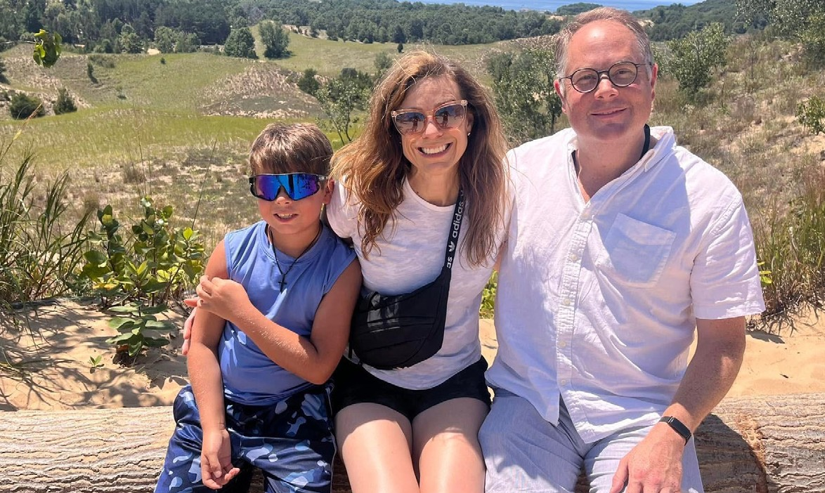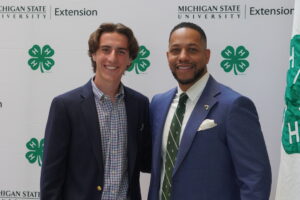History

In 1951, business and educational leaders gathered to explore the need for an organization “to help procure financial aid for the needs of an expanded 4-H program,” as stated in the minutes of the Sept. 22, 1951, meeting of the Friends of 4-H. The committee met again in February 1952 to establish the articles of incorporation and bylaws for the Michigan 4-H Foundation. The articles were filed on April 25, 1952.
On May 27, 1952, the first meeting of the Michigan 4-H Foundation featured a ceremonial signing of the “Founders Scroll” by the six incorporators and charter members. The six incorporators were Joseph H. Alexanian, Joseph C. Cahill, H.J. Gallagher, Milon Grinnell, George A. Haggerty and Arne G. Kettunen. The first 15 trustees and officers were subsequently elected to the board of trustees.
Seven decades years later, the Michigan 4-H Foundation is a $11.75 million 501(c)(3) fundraising organization led by a 21-member board of trustees.
HIGHLIGHTS OF SIX DECADES
1952-1969
After four years of existence, in 1956 the board launches the Camp Kett Campaign, its first major fundraising campaign. By 1957, the foundation acquires nearly 140 acres of property with frontage on Center Lake in Osceola County for the construction of Camp Kett. A cornerstone ceremony is held Sept. 17, 1960 to dedicate the camp in honor of Arne G. Kettunen, who died in 1959. In 1961, Camp Kett opens as the nation’s first 4-H conference center.
1970-1979
In 1972, Camp Kett is renamed Kettunen Center. The Detroit 4-H Center also opens that year launching a major Michigan 4-H urban programming initiative. The 4-H Proud Equestrians Program – therapeutic horseback riding – begins in 1974. By 1977, the Kettunen Center Improvement Project is launched to update facilities. And, in 1979, the 4-H Mainstreaming Project is funded with major grants from the C.S. Mott and W.K. Kellogg foundations – the largest grant to a state 4-H program at the time.
1980-1989
In 1980, an earth-sheltered home is constructed at Kettunen Center as the residence for the Kettunen Center director. By 1984, the Michigan 4-H Foundation begins to help county 4-H programs establish funds. 1987 marked the gift of Tollgate Center to MSU for use as a 4-H education center is supported by an additional grant from the Americana Foundation to the Michigan 4-H Foundation. In 1988, the W.K. Kellogg Foundation grants $2.16 million to fund the “SPACES: Preparing Kids for a High-Tech and Global Future” initiative for early adolescent development.This same year Kettunen Center begins offering 4-H environmental and outdoor education programs (formerly called 4-H TRACKERS).
1990-1999
The Michigan 4-H Children’s Garden opens in 1993 on the campus of Michigan State University as the first youth-focused garden located on a university campus. In 1994, Vision 2021: Campaign for Kettunen Center is launched. This $2.5 million campaign improved facilities (including the Red Oak wing addition and the Mawby Learning Center), grounds and 4-H environmental programs. The Polish Connections project is initiated in 1995, resulting in 4-H programs in Poland and the Michigan 4-H Foundation becoming the fund development model for the creation of the Polish 4-H Foundation. In 1998, the Michigan 4-H Youth Conservation Council is established.
2000-2009
The Campaign for 4-H is launched July 1, 2000. The campaign, which concluded in 2007, raised over $10 million, exceeding previous capital campaign totals by more than $7 million. In 2001, the Herbert H. and Grace A. Dow Foundation funds the Dow Connected Gardens Project. The Alice Mahoney estate gift for the 4-H Children’s Garden is also the largest estate gift to date that year. In 2002, Michigan opens the national 4-H centennial year with the Michigan Conversation on Youth Development. Celebration events took place throughout the year and included a family reunion, gala, tailgate and the induction of the inaugural class of the 4-H Emerald Clover Society. In 2003, the Indoor Michigan 4-H Children’s Garden opens, providing year-round educational access to science-based learning.
Beginning in 2006 several groups launch campaigns to establish endowments for Michigan 4-H. They include the the funds for 4-H international programs, Michigan Farm Bureau 4-H Excellence in Agriculture, Michigan 4-H volunteer recognition and the multi-focused fund created by the Michigan Division of the Woman’s National Farm & Garden Association (WNF&GA). In 2008, the Pete and Sally Smith Schoolyard Demonstration Garden opens. This 2,500-square-foot addition to the outdoor Michigan 4-H Children’s Garden offers ideas for creating gardens in small spaces. In 2008, Kettunen Center is certified as a Green Lodging Michigan Partner by the Michigan Department of Energy, Labor and Economic Growth and in 2009, upgraded to a Green Lodging Michigan Steward.
2010-2019
The $12.5 million Campaign for Michigan 4-H’s Future begins July 1, 2011. The Make the Match County 4-H Endowment Campaign is launched in 2013 with the goal of increasing 4-H philanthropy by local 4-H family support. Matching funds were offered for counties to grow local 4-H endowments. In 2014, the first Town and Country Gala is held in Grand Rapids, marking the public launch of the Campaign for Michigan 4-H’s Future and featuring the 4-H Emerald Awards recognition. Later that year, the Michigan 4-H Foundation receives the single largest gift to date – a $3.85 million estate gift comprising a $1.85 million cash and a $2 million property distribution from the Mary (Sally) and Donovan (Pete) Smith trusts. Bathrooms are built in the outdoor Michigan 4-H Children’s Gardens in 2015.
On April 21, 2017, the Michigan 4-H Foundation Board of Trustees voted to align the Michigan 4-H Foundation and its operations more closely with Michigan State University (MSU) Extension and MSU University Advancement. The decision came after the Michigan 4-H Foundation Board of Trustees Executive Committee’s extensive review of the opportunities and challenges of consolidating resources. The Michigan 4-H Foundation Campaign for Michigan 4-H’s Future concluded Dec. 31, 2019 with $13.3 million raised over seven years, making it the largest campaign in the foundation’s history.
2020-present
During the COVID-19 pandemic, Kettunen Center permanently closed its doors July 1, 2020, after the Michigan 4-H Foundation board agreed that closing and selling the facility was in the best interest of the nonprofit organization. Appraised at $1.5 million, the Kettunen Center property was sold for $1.7 million on Nov. 18, 2021 to Bais Chabad of Kalkaska, Inc., a religious youth organization which previously leased the center for a youth camp during summer 2021. Proceeds from the sale created the A.G. Kettunen Endowment, the Michigan 4-H Foundation Operational Endowment and helped grow the Michigan 4-H Foundation Reserve Fund.
More in this Section

It takes confidence and courage to try new things and I am thankful to 4-H for providing that opportunity for me.
— Ethan McLaughlin, Monroe County

Sponsor a Brick
Become a permanent part of the Michigan 4-H Children's Garden by sponsoring a brick! Bricks can be donated in your name; in honor of a family, friend or club; or in memory of loved ones. Learn more: Sponsor a brick!.








